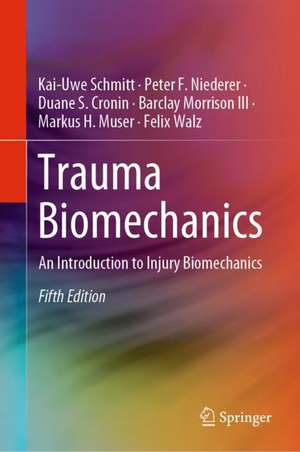Trauma Biomechanics: An Introduction to Injury Biomechanics
Autor Kai-Uwe Schmitt, Peter F. Niederer, Duane S. Cronin, Barclay Morrison III, Markus H. Muser, Felix Walzen Limba Engleză Hardback – 15 mar 2019
The book addresses a wide range of topics in injury biomechanics, including anatomy, injury classification, injury mechanisms, and injury criteria. Further, it provides essential information on regional injury reference values, or injury criteria, that are either currently in use or proposed by both US and European communities. Although the book is intended as an introduction for doctors and engineers who are newcomers to the field of injury biomechanics, sufficient references are provided for those who wish to conduct further research, and even established researchers will find it useful as a reference guide to the biomechanical background of each proposed injury mechanism and injury criterion.
Preț: 912.67 lei
Preț vechi: 960.71 lei
-5% Nou
Puncte Express: 1369
Preț estimativ în valută:
174.63€ • 182.83$ • 144.50£
174.63€ • 182.83$ • 144.50£
Carte tipărită la comandă
Livrare economică 07-21 aprilie
Preluare comenzi: 021 569.72.76
Specificații
ISBN-13: 9783030116583
ISBN-10: 3030116581
Pagini: 336
Ilustrații: XVIII, 287 p. 128 illus.
Dimensiuni: 155 x 235 mm
Greutate: 0.61 kg
Ediția:5th ed. 2019
Editura: Springer International Publishing
Colecția Springer
Locul publicării:Cham, Switzerland
ISBN-10: 3030116581
Pagini: 336
Ilustrații: XVIII, 287 p. 128 illus.
Dimensiuni: 155 x 235 mm
Greutate: 0.61 kg
Ediția:5th ed. 2019
Editura: Springer International Publishing
Colecția Springer
Locul publicării:Cham, Switzerland
Cuprins
Introduction.- Methods in Trauma Biomechanics.- Head Injuries.- Spinal Injuries.- Thoracic Injuries.- Abdominal Injuries.- Injuries of the Pelvis and the Lower Extremities.- Injuries of the Upper Extremities.- Impairment and injuries resulting from chronic mechanical exposure.- Ballistic and Blast Trauma.- Solutions to exercises.
Recenzii
“Trainees or teachers with an interest in the physical effects of injury are an appropriate audience for this book … . This book remains a standard in this discipline. The addition of cellular biomechanics is effectively done and appropriately incorporated into the discussion of neurological injury where relevance is greatest. This remains an important contribution produced by leaders in the discipline.” (David J. Dries, Doody's Book Reviews, July 19, 2019)
Notă biografică
Kai-Uwe Schmitt, Ph.D. M.Eng. M.Sc. ICID, lectures on “trauma biomechanics” and “biomechanics of sports injuries” at the Swiss Federal Institute of Technology (ETH Zürich). He is also a Professor heading the Academic-Practice-Partnership between University of Applied Sciences and the University Hospital Berne, Switzerland.
Peter F. Niederer is a Professor Emeritus for Biomedical Engineering, ETH Zurich. His main interests include biomechanics, the heart and circulatory system, and medical optics.
Dr. Duane Cronin is a Professor in Mechanical and Mechatronics Engineering at the University of Waterloo and Canada Research Chair in Trauma Biomechanics and Injury Prevention. His research interests include blast and ballistic injury mitigation, computational human body models to predict crash induced injuries, and high deformation-rate material characterization.
Dr. Barclay Morrison is a Professor in the Department of Biomedical Engineering at ColumbiaUniversity striving to reduce the societal costs of traumatic brain by understanding the initiating biomechanics and its ensuing pathobiology.
Markus Muser, Ph.D. is a co-founder and current director of the AGU Zurich. Having worked in the area of trauma biomechanics since 1993, his main interests are in WAD, safety of vulnerable road users, and safety of low-mass vehicles.
Felix H. Walz, M.D. is a former Professor of Forensic Biomechanics at the University of Zurich. He is a co-founder and former director of the Working Group on Accident Mechanics in Zurich (AGU).
Peter F. Niederer is a Professor Emeritus for Biomedical Engineering, ETH Zurich. His main interests include biomechanics, the heart and circulatory system, and medical optics.
Dr. Duane Cronin is a Professor in Mechanical and Mechatronics Engineering at the University of Waterloo and Canada Research Chair in Trauma Biomechanics and Injury Prevention. His research interests include blast and ballistic injury mitigation, computational human body models to predict crash induced injuries, and high deformation-rate material characterization.
Dr. Barclay Morrison is a Professor in the Department of Biomedical Engineering at ColumbiaUniversity striving to reduce the societal costs of traumatic brain by understanding the initiating biomechanics and its ensuing pathobiology.
Markus Muser, Ph.D. is a co-founder and current director of the AGU Zurich. Having worked in the area of trauma biomechanics since 1993, his main interests are in WAD, safety of vulnerable road users, and safety of low-mass vehicles.
Felix H. Walz, M.D. is a former Professor of Forensic Biomechanics at the University of Zurich. He is a co-founder and former director of the Working Group on Accident Mechanics in Zurich (AGU).
Textul de pe ultima copertă
This well-established book on injury biomechanics has been extensively revised and expanded for this new edition. It now includes a fundamental treatment of the mechanics at a cellular level, written by the new coauthor Prof. Barclay Morrison III from Columbia University. Furthermore, considerably more attention is paid to computer modeling, and in particular modeling the human body.
The book addresses a wide range of topics in injury biomechanics, including anatomy, injury classification, injury mechanisms, and injury criteria. Further, it provides essential information on regional injury reference values, or injury criteria, that are either currently in use or proposed by both US and European communities. Although the book is intended as an introduction for doctors and engineers who are newcomers to the field of injury biomechanics, sufficient references are provided for those who wish to conduct further research, and even established researchers will find it useful as a referenceguide to the biomechanical background of each proposed injury mechanism and injury criterion.
Caracteristici
Provides both an introduction to and overview of injury biomechanics, including sport injuries Features tried and tested material drawn from a course that is currently held in similar form at several European and American universities Requires no previous background in biomechanics Includes cellular biomechanics
